In the German debate, some consider e-fuels for combustion cars an important alternative to EVs. China, on the other hand, has so far focused entirely on the battery for the future of automobiles. From Beijing’s point of view, e-fuels and other alternative fuels are particularly interesting for reducing emissions in air traffic, as Frank Sieren writes. However, the technology is still in its infancy in China, just as it is worldwide, due to high costs and limited availability of raw materials. But there are first pilot projects and companies are already securing access to raw materials for bio-kerosene.
Meanwhile, a new conflict is brewing between China and the USA – over deep-sea fishing. China’s fleet is now active around the globe, as a recent tragic accident involving the deaths of 39 sailors in the middle of the Indian Ocean demonstrated. Global fishing in itself is not the problem, but there is growing criticism of the Chinese fleet’s practices, as Joern Petring explains. China’s fleet is increasingly accused of so-called IUU fishing, which stands for illegal, unreported and unregulated fishing.
The US now intends to take action against China’s problematic fishing practices and has already imposed sanctions on two Chinese fishing companies. Conversely, Beijing accuses US fishermen of illegal fishing on the high seas. It remains to be seen how the dispute will end. Meanwhile, overfishing is affecting marine ecosystems all over the world.

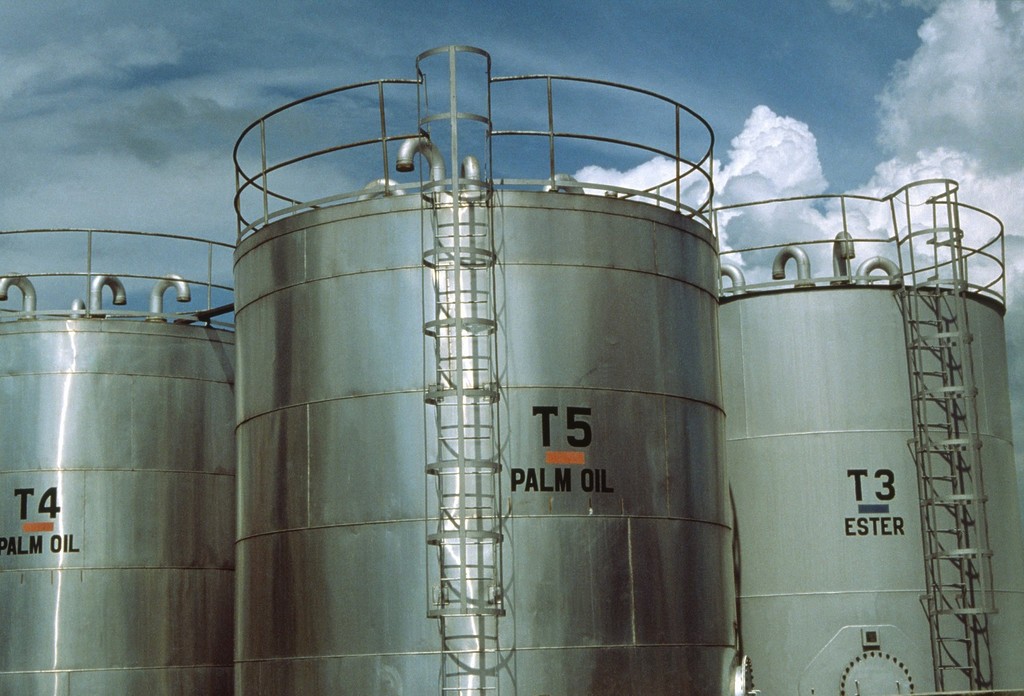
Some representatives of the German automotive industry are demanding the option of using carbon-neutral e-fuels. Proponents believe that the combustion engine should be given a chance to coexist with electric cars under the credo of “technology openness.” BMW CEO Oliver Zipse, for example, is concerned about the future of the 260 million vehicles in Europe that still have combustion engines: “The main impact of e-fuels is on existing fleets, not in the regulation of new vehicles. We aren’t discussing the existing fleet. The only opportunity to make a difference there is e-fuels.”
But the e-fuel debate will probably be decided in China, the world’s largest car market. And Beijing is still hesitant about e-fuels. There are a handful of pilot projects in which small quantities are produced synthetically, at high cost. The government is therefore considering very carefully where e-fuels could be of use. One answer is: For transport where batteries are unsuitable, such as ships and, above all, aircraft.
The International Council on Clean Transportation calculated that Chinese aviation emitted more than 100 million tons of CO2 in 2019, i.e., before the pandemic – a share of 13 percent of global air traffic. But the share will rise because the number of aircraft in China will grow rapidly. According to research, the demand for aviation fuel will increase fivefold by 2050.
On the one hand, this involves low-carbon fuels, a type of aviation biofuel made from a wide variety of raw materials such as cooking oil, vegetable oil, household waste, exhaust gasses and agricultural residues – on the other hand, it also involves fully climate-neutral e-fuels, which are produced using renewable energy such as hydrogen-generated electricity (power-to-liquid/PtL) or solar heat (sun-to-liquid technologies/StL). Both technologies combined are called Sustainable Aviation Fuels (SAF). The development of SAF is still in its infancy, in China and everywhere else.
In a late 2022 study, the Institute of Energy at Peking University explored the potential for SAF – and found it considerable. A significant advantage is that the airport infrastructure does not have to be upgraded. And the transition from traditional aviation fuel to biofuel is seamless, as the mixture ratio is flexible.
State-owned companies are already preemptively securing access to necessary resources for aviation biofuel. Last year alone, Chinese companies invested 1.35 billion US dollars for the production of aviation biofuel from palm oil in Malaysia in cooperation with the Malaysian Palm Oil Board (MPOB). The Institute of Coal Chemistry of the Chinese Academy of Sciences is also involved. The goal is to build the world’s most cutting-edge SAF plants.
In Europe, however, palm oil is considered ecologically problematic, as the cultivation of huge palm oil monocultures also involves clearing primary tropical forests. As of the end of 2023, the EU will ban goods from deforested rainforests. The import of raw materials and products like palm oil will then only be allowed if they have been produced without deforestation. The law must be implemented by the end of the year. This means that Europe will likely look for other sources of aviation biofuel.
The biggest challenge everywhere is producing SAF at a low cost. Typically, this is where a political mandate from Beijing comes in to give large-scale development the necessary momentum because development is too expensive to be left to the market. But there is still no such decree for SAF.
Currently, the most common and cheapest global approach is the “hydroprocessed esters and fatty acids” (HEFA) process, in which animal fats and vegetable oils are refined into aviation biofuel. So far, only a handful of test plants have been set up in China, including Sinopec Zhenhai Refining & Chemical Company (Zhenhai Refining). It has been producing since 2022, making it China’s first SAF producer, mainly by using animal fats. This is another problem because animals are large CO2 emitters. At least the plant can potentially also process up to 100,000 tons of used cooking oil.
There is also the Fischer-Tropsch process (G+FT). It was invented almost 100 years ago at the former Kaiser Wilhelm Institute for Coal Research in Germany. It produces hydrocarbons by converting a mixture of carbon monoxide and hydrogen from biomass. However, China sees particular potential in the power-to-liquid (PtL) process. The main challenge now is to produce the necessary quantities at a reasonable price. So far, production costs are five to six times higher and account for up to 40 percent of the airlines’ costs.
The International Air Transport Association calculates that 358 million tons of SAF will be required worldwide to cover about 65 percent of aircraft fuel demand by 2050. To date, only 0.01 percent of this amount has been produced.
In any case, China is currently waiting on Beijing to give the go-ahead and at least introduce regulations similar to those already underway in the EU. The ReFuelEU Aviation Initiative plans for all flights from EU airports to use two percent SAF in 2025, five percent in 2030, and finally, 63 percent in 2050.
Beijing’s silence on the issue is odd. Perhaps China wants to secure the resources first, like in Malaysia, and only then attract attention with an official directive. If SAFs can be produced at marketable prices, combustion cars will ultimately also benefit, and BMW CEO Zipse will have one less thing on his mind.
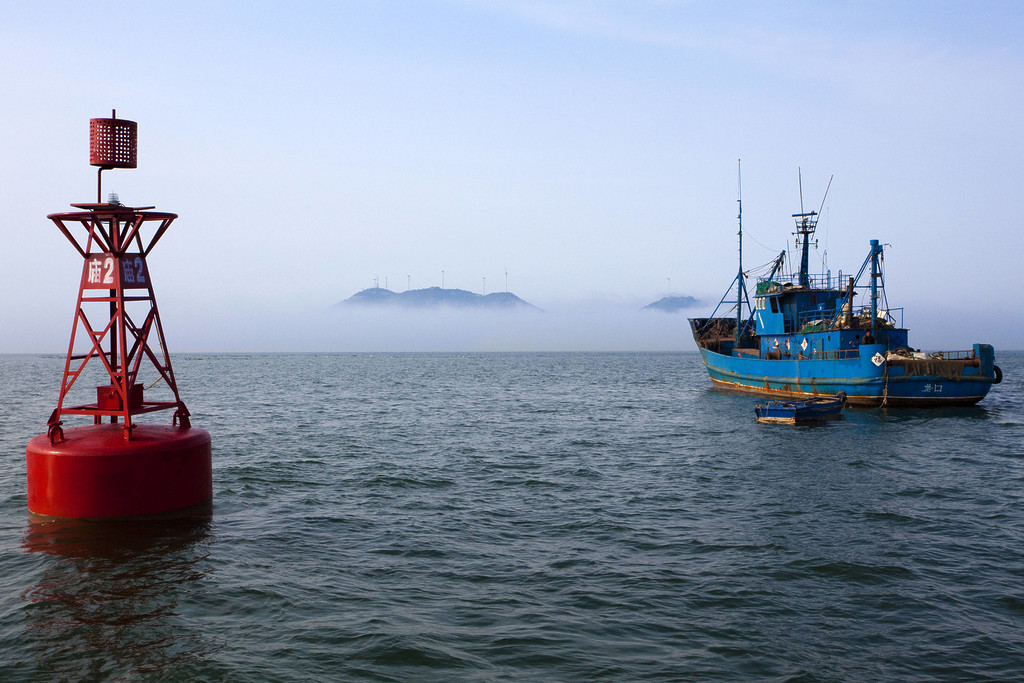
On May 17, a tragic accident occurred in the middle of the Indian Ocean. Chinese state media reported the sinking of the deep-sea fishing vessel Lu Peng Yuan Yu 028. The ship carried a crew of 39, all presumed to have died.
The disaster occurred 1000 kilometers south of Sri Lanka, far from Chinese waters. The incident sheds light on the fact that China’s fishing activities span virtually the entire globe. Chinese fleets fish off South America, Africa and even Antarctica coasts.
It is estimated that more than 11,000 ships are deployed. China has invested heavily in the expansion of this fleet. The country is a major seafood consumer, and the fleet plays a vital role in meeting the high demand because its own coasts are increasingly overfished.
An international rescue operation has been launched for the Lu Peng Yuan Yu crew with the participation of Australia, Sri Lanka, the Philippines and other countries. But this solidarity cannot hide that China’s activities have come under growing international criticism.
Environmentalists and governments accuse China of overfishing and illegal, unreported and unregulated (IUU) fishing. According to the EU, this term includes “fishing without a valid license, in a closed area, beyond a closed depth or during a closed season, or by using prohibited gear, as well as the failure to fulfill reporting obligations, falsifying its identity, or obstructing the work of inspectors.” IUU fishing is considered one of the biggest threats to fish stock sustainability and marine biodiversity worldwide. Under a 2010 EU IUU regulation, fisheries products may only be imported if a certificate can be provided for the product.
According to an analysis published in February by the Brookings Institute in Washington, China is “increasingly identified as a major perpetrator of IUU fishing.” China scored worst out of 152 countries examined in an IUU fishing index published by the Global Initiative Against Transnational Organized Crime, followed by Russia and South Korea. The USA landed in 27th place.
The Chinese fleet also further fuels geopolitical tensions between Washington and Beijing. Recently, US President Joe Biden instructed his authorities to take more decisive action against illegal fishing and the mistreatment of workers. Human rights activists accuse some Chinese companies of unacceptable working conditions on their ships.
In May 2022, the Quad Alliance of the US, Japan, Australia and India announced a satellite-based initiative to help countries in the Pacific track illegal fishing. In December, the US imposed sanctions on two major Chinese fishing companies. The US Coast Guard also works with Pacific countries to better monitor the fishing industry.
The South American coast has become a particular hotspot in recent years. According to an AP report, the number of Chinese fishing vessels in the region has increased eightfold to more than 470 between 2009 and 2021. Instead of 70,000 tons, the Chinese now pull more than 420,000 tons of squid from the waters.
Last fall, a dangerous encounter occurred off the Galápagos Islands in Ecuador. A US Coast Guard vessel spotted a Chinese fishing fleet suspected of IUU fishing. The boats fled when the Coast Guard attempted to board several Chinese vessels. At least one of the vessels had reportedly approached the US Coast Guard vessel aggressively, forcing it to take evasive maneuvers. According to AP, boarding vessels on the high seas is a legal means as part of collective efforts to protect threatened ocean fish stocks.
Beijing lodged a formal complaint, according to the report. The issue was also raised when the Chinese Foreign Ministry summoned US Ambassador Nicholas Burns to an emergency meeting regarding Speaker Pelosi’s Taiwan visit.
Lately, Beijing has not only rejected the accusations but even turned the tables. A spokesperson for Beijing’s Foreign Ministry claimed in March that US fishing vessels frequently engaged in illegal fishing on the high seas and in waters under the jurisdiction of other countries.
“We call on the US side to do its own part on the issue of distant-water fisheries first, rather than act as a judge or police to criticize other countries’ normal fishing activities,” said spokesperson Wang Wenbin. The two superpowers have found their newest quarrel with the fisheries dispute.
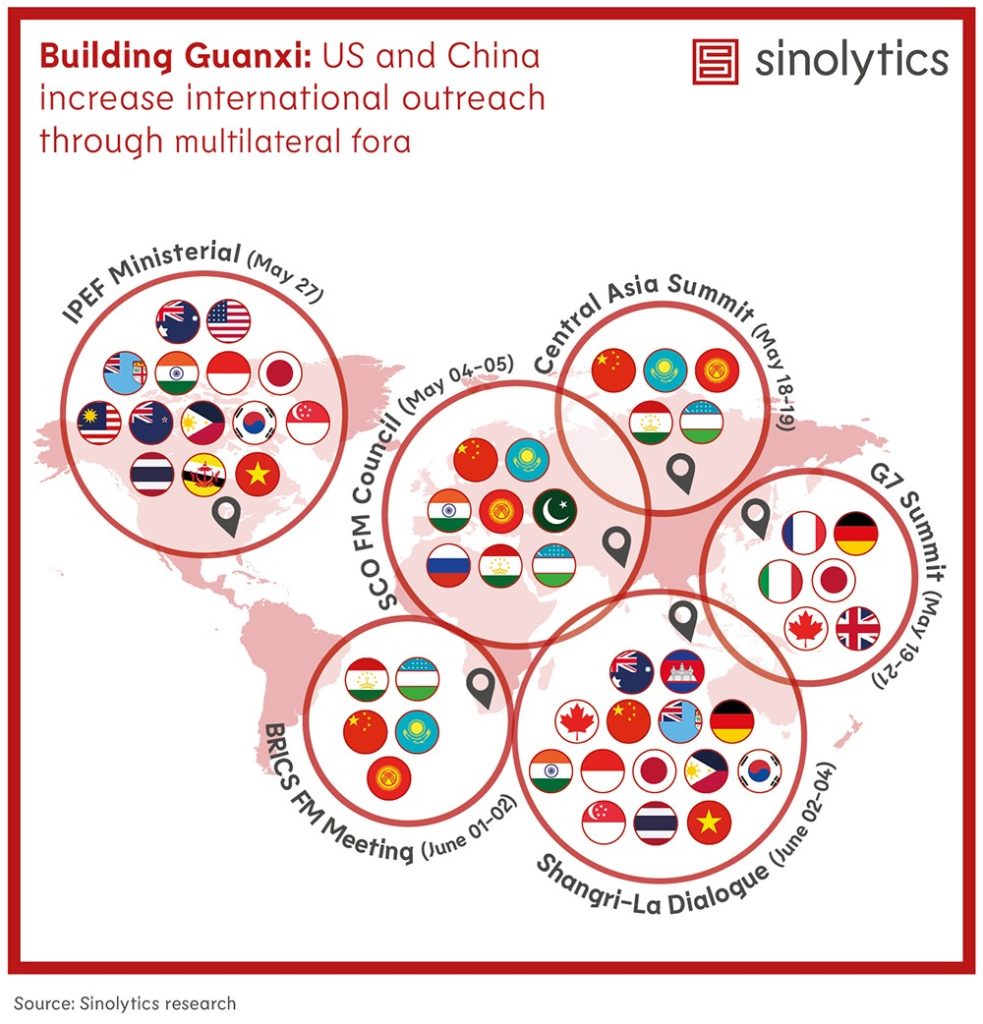
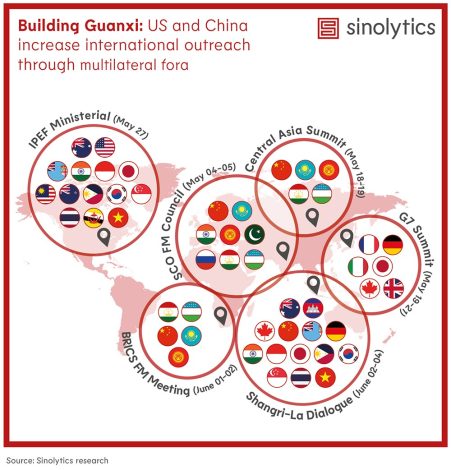
Sinolytics is a European consulting and analysis company specializing in China. It advises European companies on their strategic orientation and concrete business activities in the People’s Republic.
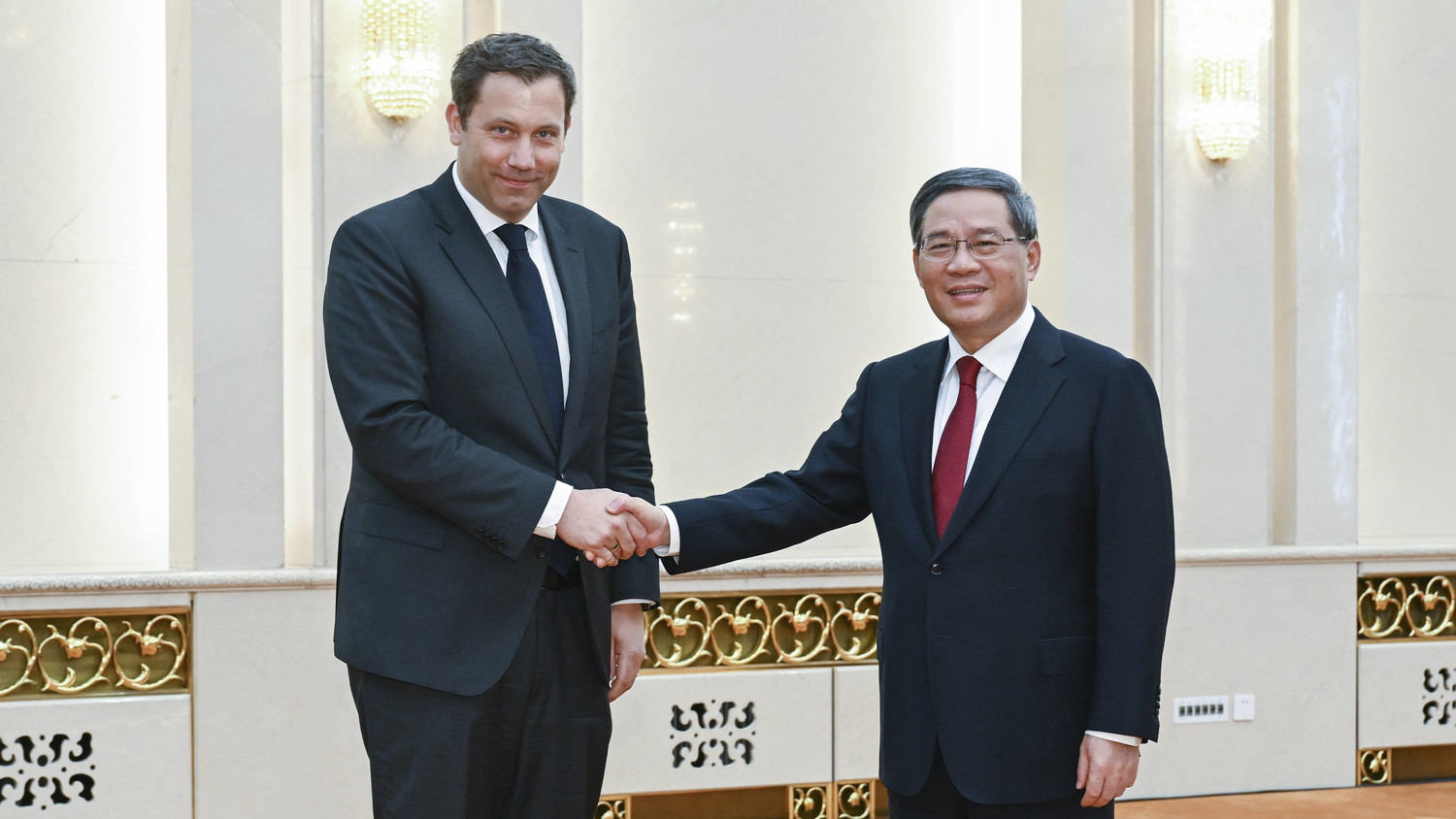
During his visit to China, Lars Klingbeil, head of the German Social Democratic Party (SPD), was welcomed by high-ranking politicians. He already met Premier Li Qiang on Monday and held talks at the International Liaison Department of the Communist Party. This was followed on Tuesday by a meeting with CP strategist Wang Huning, current number four in the CCP hierarchy. Klingbeil’s trip served, among other things, to prepare for the German-Chinese government consultations in Berlin on June 20.
The high-profile reception shows how important Germany and the Social Democratic Party, in particular, are to China. The Communist Party aims to expand exchanges with the Social Democrats to raise the partnership with Germany “to a higher level” and build the foundation for economic and trade cooperation, state media quoted Premier Li after the meeting with Klingbeil. China would be pleased if more German companies came to China, Li said, promising to improve market access as well as the protection of intellectual property.
The SPD could use its important influence here, Li said. With this remark, he probably alluded to the fact that China knows how to distinguish SPD policy from the China-critical stance of government coalition partners, the Greens and the Free Democratic Party (FDP). China Daily quoted Klingbeil as saying that the SPD “attaches importance to strategic dialogue and communication with the CPC.”
“They were open and constructive talks,” an SPD spokeswoman told Deutsche Presse-Agentur. The talks also covered the Ukraine war and the “German diversification strategy” in economic cooperation. It was agreed to “intensify the strategic dialogue between the two parties, focusing more on transformation, disarmament and arms control issues, and the human rights situation.” The party dialogue also included Klingbeil’s talks with the International Liaison Department and Wang Huning.
According to dpa, the meeting with Wang lasted much longer than planned. However, initially, there was no information about the details of the meeting. After his political meetings, Klingbeil gave a speech at Beijing Foreign Studies University and spoke with students. In the afternoon, he continued his trip to South Korea. The Asia trip of the SPD leader is also part of the realignment of the Social Democratic foreign and security policy. ck
The European Parliament and the EU Council have reached a political agreement on the Anti-Coercion Instrument (ACI). The instrument has thus passed the final negotiating hurdle among the EU institutions. It is intended to give the European Union the opportunity to better fend off coercive economic measures by non-EU countries – first and foremost China – and primarily serve as a deterrent.
“The ACI provides an important building block for the EU’s economic security and its Member States,” EU Commissioner for Trade, Valdis Dombrovskis, said Tuesday after the agreement. “We will only use it when we need to ensure that our policy decisions remain free from interference by third countries.”
The prime case for using the ACI is China’s de facto trade embargo against Lithuania after Taiwan was allowed to open an official representative office called “Taiwan” in Vilnius. The new trade policy instrument is set to enter into force this fall. It is still unclear whether ACI could be used retroactively in Lithuania’s case.
The EU may soon resort to the instrument in another dispute: China is currently preparing countermeasures against export restrictions on semiconductor technology, such as those imposed by the Netherlands. “This could be a first use case for the new instrument,” Bernd Lange, Chair of the European Parliament’s International Trade Committee, told Table.Media.
The SPD politician voiced his satisfaction: “With the new defensive trade policy instrument, Europe can more confidently stand up for its own interests on the world stage and defend itself against economic blackmail.” The EU Parliament long lobbied against attempts by the EU Council to water down the instrument. “We have ensured precise definitions and a clear timetable so that the instrument cannot be postponed for all eternity,” Lange stressed.
Once the EU Commission has identified a case of economic coercion, the ACI will first seek to establish a dialogue with the respective country with the goal of stopping the coercive measures. If this fails, the EU will have access to a range of possible countermeasures. These include the introduction of tariffs, restrictions on trade in services, access to foreign direct investment or public procurement. ari/thop
The president of Honduras, Xiomara Castro, will visit Beijing this Friday for an official visit and stay in China until Wednesday. Honduras needs to strengthen its political, scientific, technical, economic and cultural ties with China, Castro posted Monday on her Twitter account.
It is Castro’s first official visit to China since Honduras severed ties with Taiwan in March in favor of relations with Beijing. According to Honduran media, the invitation came at the personal request of China’s President Xi Jinping. A new Chinese embassy opened in Honduras’ capital Tegucigalpa on Monday.
The Central American country also hopes to find a way out of its permanent financial crisis by partnering with China. The country also owes Taiwan around 600 million US dollars. fpe
The Hong Kong government is considering banning the “Glory to Hong Kong” protest anthem. Protesters chanted this hymn during pro-democracy protests in 2019. It was also popular at international solidarity rallies for the movement. On Tuesday, the Ministry of Justice stated that the goal of banning its rendition and dissemination was to prevent people from inciting secession. Another stated reason was that the song should not be “mistakenly presented as the national anthem of Hong Kong.” This marks another step toward eroding freedom of speech in the city.
The special administrative region does not officially have its own anthem. Most recently, however, “Glory To Hong Kong” was played instead of the Chinese national anthem, for example, after Hong Kong’s ice hockey team defeated Iran in an international tournament.
An anonymous musician composed “Glory to Hong Kong,” a classical-style anthem, in 2019. The lyrics were then jointly finalized by protesters on an Internet forum. It says, for example, “Sons and daughters of Hong Kong, Let us March together for what is right! This is the Revolution of Our Times!” rtr/fpe

There is currently a passionate debate about the German government’s new China strategy. And that is a good thing. I have been actively participating in this debate. However, in this op-ed, I, for once, do not want to promote my position. Instead, I suggest we pause for a moment and reflect on the culture of debate. In my opinion, it suffers from a lack of self-critical reflexivity.
Colleagues often tell me they do not wish to participate in the China debate because it is too polarized. I am not convinced. True polarization would exist if calls were made for Germany to become China’s economic satellite on the one side and, on the other, arguments were made for strict decoupling. In reality, however, no one is making such extreme demands.
At the heart of the dispute is a different assessment of the opportunities and risks of engaging with China. However, this does not mean there are no problems in the discourse. Recently, China expert Kai Strittmatter highlighted straw man arguments. One example: Someone prefers dialogue and cooperation with China, blasts the fictitious counterposition of strict decoupling, and then declares himself the winner. Such bogus arguments harm our democratic culture of debate.
One variant of the straw man argument is false dichotomies – like the one of distrust and trust. It suggests that we have only two options: Either we completely distrust our Chinese partners under party-state control, or we fully trust them. But there is also earned trust. The Chinese Communist Party (CCP) under Xi’s leadership has carelessly squandered it over the past few years.
It is entirely legitimate to argue for continued dialogue and cooperation with China. But those who promote this position must also explain how we can minimize risks and address existing problems. The principle of hope alone will not bring about a change in Beijing’s behavior. Those who bring a healthy dose of mistrust and regularly review progress in cooperation could theoretically still take the plunge of China cooperation today. However, I believe doubts are warranted.
The experience with cooperation over the past ten years offers little room for optimism. What kind of dialogue and cooperation with “official China” are still possible at all under the conditions of censorship and forced partnership in 2023? Given how the CCP opposes open societies, we should not give it the benefit of the doubt. More autocracy competence is needed here.
In this context, I would like to point out the impact of China’s highly illiberal NGO Law of 2017. This law has made open and unbiased Sino-German exchange between civil society virtually impossible. The party deliberately destroyed the networks of trust cultivated over the years between German and Chinese partner organizations.
The Ministry of Public Security has been in charge since 2017. The Konrad Adenauer Foundation, Heinrich Böll Foundation, and Rosa Luxemburg Foundation have been forced to cooperate with the CCP-controlled Friendship Society. The latter operates as a part of the united front system. This raises the problem of co-optation. How much autonomy to act is left to the foundations in China now?
The current debate on the planned cooperation between the cities of Kiel and Qingdao is another example of a problematic public debate. In principle, it would naturally be welcome if city partnerships allowed for an unbiased exchange for the benefit of international understanding and economic cooperation. There is no dissent in this whatsoever. But here, too, past experience has been sobering.
A study by the Berlin-based think tank Merics has found that the CCP is expanding its influence through the sub-national level. Here, German local governments suffer from information asymmetry. Who at the local level is truly aware of the risk of co-optation by the CCP’s united front policy? Party-controlled Chinese cooperation partners can easily entangle us here as well.
I am aware that municipal politicians dislike being patronized by Berlin. But national security issues affect us all. Proper risk management also requires the documentation of due diligence. Those who want to cooperate with autocratic China should also seek advice from the Federal Office for the Protection of the Constitution and the Federal Intelligence Service. The task now is to make well-informed decisions and to take responsibility for them.
Political scientist Dr. Andreas Fulda is a lecturer at the University of Nottingham. He has lived and worked in the PRC and Taiwan for eight years. Fulda is currently writing his new book, “Germany and China. How Entanglement Undermines Freedom, Prosperity and Security” (Bloomsbury, 2024).
Thomas Fabian Derichs has taken over as Head of Sales and Market Development Engineering Asia at materials manufacturer Covestro. For his new duties, Derichs will move from the company’s headquarters in the German city of Leverkusen to Shanghai.
Huang Zhenyu is the new General Manager of Xiaomi’s Auto Supply Chain Department. Huang is a veteran of the auto industry and is expected to help the Chinese tech company expand its EV division. Huang’s previous roles include Vice President of the Automotive Division at Xiaomi and General Manager of Canadian auto parts giant Magna International.
Is something changing in your organization? Let us know at heads@table.media!

A new food trend is sweeping China. Under the not exactly politically correct term “white people food 白人餐,” Internet users have been posting their Tupper boxes stuffed with raw vegetables and gently cooked vegetables for days. The trend was inspired by Chinese expatriate students in Europe and the US, who were intrigued by the minimalist lunches of their study and work colleagues. But the hype is polarizing: Some celebrate the healthy Tupper-To-Go as time-saving and low in calories. Others sarcastically call it “a reminder that the workplace is not supposed to be a place to enjoy life.”
In the German debate, some consider e-fuels for combustion cars an important alternative to EVs. China, on the other hand, has so far focused entirely on the battery for the future of automobiles. From Beijing’s point of view, e-fuels and other alternative fuels are particularly interesting for reducing emissions in air traffic, as Frank Sieren writes. However, the technology is still in its infancy in China, just as it is worldwide, due to high costs and limited availability of raw materials. But there are first pilot projects and companies are already securing access to raw materials for bio-kerosene.
Meanwhile, a new conflict is brewing between China and the USA – over deep-sea fishing. China’s fleet is now active around the globe, as a recent tragic accident involving the deaths of 39 sailors in the middle of the Indian Ocean demonstrated. Global fishing in itself is not the problem, but there is growing criticism of the Chinese fleet’s practices, as Joern Petring explains. China’s fleet is increasingly accused of so-called IUU fishing, which stands for illegal, unreported and unregulated fishing.
The US now intends to take action against China’s problematic fishing practices and has already imposed sanctions on two Chinese fishing companies. Conversely, Beijing accuses US fishermen of illegal fishing on the high seas. It remains to be seen how the dispute will end. Meanwhile, overfishing is affecting marine ecosystems all over the world.


Some representatives of the German automotive industry are demanding the option of using carbon-neutral e-fuels. Proponents believe that the combustion engine should be given a chance to coexist with electric cars under the credo of “technology openness.” BMW CEO Oliver Zipse, for example, is concerned about the future of the 260 million vehicles in Europe that still have combustion engines: “The main impact of e-fuels is on existing fleets, not in the regulation of new vehicles. We aren’t discussing the existing fleet. The only opportunity to make a difference there is e-fuels.”
But the e-fuel debate will probably be decided in China, the world’s largest car market. And Beijing is still hesitant about e-fuels. There are a handful of pilot projects in which small quantities are produced synthetically, at high cost. The government is therefore considering very carefully where e-fuels could be of use. One answer is: For transport where batteries are unsuitable, such as ships and, above all, aircraft.
The International Council on Clean Transportation calculated that Chinese aviation emitted more than 100 million tons of CO2 in 2019, i.e., before the pandemic – a share of 13 percent of global air traffic. But the share will rise because the number of aircraft in China will grow rapidly. According to research, the demand for aviation fuel will increase fivefold by 2050.
On the one hand, this involves low-carbon fuels, a type of aviation biofuel made from a wide variety of raw materials such as cooking oil, vegetable oil, household waste, exhaust gasses and agricultural residues – on the other hand, it also involves fully climate-neutral e-fuels, which are produced using renewable energy such as hydrogen-generated electricity (power-to-liquid/PtL) or solar heat (sun-to-liquid technologies/StL). Both technologies combined are called Sustainable Aviation Fuels (SAF). The development of SAF is still in its infancy, in China and everywhere else.
In a late 2022 study, the Institute of Energy at Peking University explored the potential for SAF – and found it considerable. A significant advantage is that the airport infrastructure does not have to be upgraded. And the transition from traditional aviation fuel to biofuel is seamless, as the mixture ratio is flexible.
State-owned companies are already preemptively securing access to necessary resources for aviation biofuel. Last year alone, Chinese companies invested 1.35 billion US dollars for the production of aviation biofuel from palm oil in Malaysia in cooperation with the Malaysian Palm Oil Board (MPOB). The Institute of Coal Chemistry of the Chinese Academy of Sciences is also involved. The goal is to build the world’s most cutting-edge SAF plants.
In Europe, however, palm oil is considered ecologically problematic, as the cultivation of huge palm oil monocultures also involves clearing primary tropical forests. As of the end of 2023, the EU will ban goods from deforested rainforests. The import of raw materials and products like palm oil will then only be allowed if they have been produced without deforestation. The law must be implemented by the end of the year. This means that Europe will likely look for other sources of aviation biofuel.
The biggest challenge everywhere is producing SAF at a low cost. Typically, this is where a political mandate from Beijing comes in to give large-scale development the necessary momentum because development is too expensive to be left to the market. But there is still no such decree for SAF.
Currently, the most common and cheapest global approach is the “hydroprocessed esters and fatty acids” (HEFA) process, in which animal fats and vegetable oils are refined into aviation biofuel. So far, only a handful of test plants have been set up in China, including Sinopec Zhenhai Refining & Chemical Company (Zhenhai Refining). It has been producing since 2022, making it China’s first SAF producer, mainly by using animal fats. This is another problem because animals are large CO2 emitters. At least the plant can potentially also process up to 100,000 tons of used cooking oil.
There is also the Fischer-Tropsch process (G+FT). It was invented almost 100 years ago at the former Kaiser Wilhelm Institute for Coal Research in Germany. It produces hydrocarbons by converting a mixture of carbon monoxide and hydrogen from biomass. However, China sees particular potential in the power-to-liquid (PtL) process. The main challenge now is to produce the necessary quantities at a reasonable price. So far, production costs are five to six times higher and account for up to 40 percent of the airlines’ costs.
The International Air Transport Association calculates that 358 million tons of SAF will be required worldwide to cover about 65 percent of aircraft fuel demand by 2050. To date, only 0.01 percent of this amount has been produced.
In any case, China is currently waiting on Beijing to give the go-ahead and at least introduce regulations similar to those already underway in the EU. The ReFuelEU Aviation Initiative plans for all flights from EU airports to use two percent SAF in 2025, five percent in 2030, and finally, 63 percent in 2050.
Beijing’s silence on the issue is odd. Perhaps China wants to secure the resources first, like in Malaysia, and only then attract attention with an official directive. If SAFs can be produced at marketable prices, combustion cars will ultimately also benefit, and BMW CEO Zipse will have one less thing on his mind.

On May 17, a tragic accident occurred in the middle of the Indian Ocean. Chinese state media reported the sinking of the deep-sea fishing vessel Lu Peng Yuan Yu 028. The ship carried a crew of 39, all presumed to have died.
The disaster occurred 1000 kilometers south of Sri Lanka, far from Chinese waters. The incident sheds light on the fact that China’s fishing activities span virtually the entire globe. Chinese fleets fish off South America, Africa and even Antarctica coasts.
It is estimated that more than 11,000 ships are deployed. China has invested heavily in the expansion of this fleet. The country is a major seafood consumer, and the fleet plays a vital role in meeting the high demand because its own coasts are increasingly overfished.
An international rescue operation has been launched for the Lu Peng Yuan Yu crew with the participation of Australia, Sri Lanka, the Philippines and other countries. But this solidarity cannot hide that China’s activities have come under growing international criticism.
Environmentalists and governments accuse China of overfishing and illegal, unreported and unregulated (IUU) fishing. According to the EU, this term includes “fishing without a valid license, in a closed area, beyond a closed depth or during a closed season, or by using prohibited gear, as well as the failure to fulfill reporting obligations, falsifying its identity, or obstructing the work of inspectors.” IUU fishing is considered one of the biggest threats to fish stock sustainability and marine biodiversity worldwide. Under a 2010 EU IUU regulation, fisheries products may only be imported if a certificate can be provided for the product.
According to an analysis published in February by the Brookings Institute in Washington, China is “increasingly identified as a major perpetrator of IUU fishing.” China scored worst out of 152 countries examined in an IUU fishing index published by the Global Initiative Against Transnational Organized Crime, followed by Russia and South Korea. The USA landed in 27th place.
The Chinese fleet also further fuels geopolitical tensions between Washington and Beijing. Recently, US President Joe Biden instructed his authorities to take more decisive action against illegal fishing and the mistreatment of workers. Human rights activists accuse some Chinese companies of unacceptable working conditions on their ships.
In May 2022, the Quad Alliance of the US, Japan, Australia and India announced a satellite-based initiative to help countries in the Pacific track illegal fishing. In December, the US imposed sanctions on two major Chinese fishing companies. The US Coast Guard also works with Pacific countries to better monitor the fishing industry.
The South American coast has become a particular hotspot in recent years. According to an AP report, the number of Chinese fishing vessels in the region has increased eightfold to more than 470 between 2009 and 2021. Instead of 70,000 tons, the Chinese now pull more than 420,000 tons of squid from the waters.
Last fall, a dangerous encounter occurred off the Galápagos Islands in Ecuador. A US Coast Guard vessel spotted a Chinese fishing fleet suspected of IUU fishing. The boats fled when the Coast Guard attempted to board several Chinese vessels. At least one of the vessels had reportedly approached the US Coast Guard vessel aggressively, forcing it to take evasive maneuvers. According to AP, boarding vessels on the high seas is a legal means as part of collective efforts to protect threatened ocean fish stocks.
Beijing lodged a formal complaint, according to the report. The issue was also raised when the Chinese Foreign Ministry summoned US Ambassador Nicholas Burns to an emergency meeting regarding Speaker Pelosi’s Taiwan visit.
Lately, Beijing has not only rejected the accusations but even turned the tables. A spokesperson for Beijing’s Foreign Ministry claimed in March that US fishing vessels frequently engaged in illegal fishing on the high seas and in waters under the jurisdiction of other countries.
“We call on the US side to do its own part on the issue of distant-water fisheries first, rather than act as a judge or police to criticize other countries’ normal fishing activities,” said spokesperson Wang Wenbin. The two superpowers have found their newest quarrel with the fisheries dispute.


Sinolytics is a European consulting and analysis company specializing in China. It advises European companies on their strategic orientation and concrete business activities in the People’s Republic.

During his visit to China, Lars Klingbeil, head of the German Social Democratic Party (SPD), was welcomed by high-ranking politicians. He already met Premier Li Qiang on Monday and held talks at the International Liaison Department of the Communist Party. This was followed on Tuesday by a meeting with CP strategist Wang Huning, current number four in the CCP hierarchy. Klingbeil’s trip served, among other things, to prepare for the German-Chinese government consultations in Berlin on June 20.
The high-profile reception shows how important Germany and the Social Democratic Party, in particular, are to China. The Communist Party aims to expand exchanges with the Social Democrats to raise the partnership with Germany “to a higher level” and build the foundation for economic and trade cooperation, state media quoted Premier Li after the meeting with Klingbeil. China would be pleased if more German companies came to China, Li said, promising to improve market access as well as the protection of intellectual property.
The SPD could use its important influence here, Li said. With this remark, he probably alluded to the fact that China knows how to distinguish SPD policy from the China-critical stance of government coalition partners, the Greens and the Free Democratic Party (FDP). China Daily quoted Klingbeil as saying that the SPD “attaches importance to strategic dialogue and communication with the CPC.”
“They were open and constructive talks,” an SPD spokeswoman told Deutsche Presse-Agentur. The talks also covered the Ukraine war and the “German diversification strategy” in economic cooperation. It was agreed to “intensify the strategic dialogue between the two parties, focusing more on transformation, disarmament and arms control issues, and the human rights situation.” The party dialogue also included Klingbeil’s talks with the International Liaison Department and Wang Huning.
According to dpa, the meeting with Wang lasted much longer than planned. However, initially, there was no information about the details of the meeting. After his political meetings, Klingbeil gave a speech at Beijing Foreign Studies University and spoke with students. In the afternoon, he continued his trip to South Korea. The Asia trip of the SPD leader is also part of the realignment of the Social Democratic foreign and security policy. ck
The European Parliament and the EU Council have reached a political agreement on the Anti-Coercion Instrument (ACI). The instrument has thus passed the final negotiating hurdle among the EU institutions. It is intended to give the European Union the opportunity to better fend off coercive economic measures by non-EU countries – first and foremost China – and primarily serve as a deterrent.
“The ACI provides an important building block for the EU’s economic security and its Member States,” EU Commissioner for Trade, Valdis Dombrovskis, said Tuesday after the agreement. “We will only use it when we need to ensure that our policy decisions remain free from interference by third countries.”
The prime case for using the ACI is China’s de facto trade embargo against Lithuania after Taiwan was allowed to open an official representative office called “Taiwan” in Vilnius. The new trade policy instrument is set to enter into force this fall. It is still unclear whether ACI could be used retroactively in Lithuania’s case.
The EU may soon resort to the instrument in another dispute: China is currently preparing countermeasures against export restrictions on semiconductor technology, such as those imposed by the Netherlands. “This could be a first use case for the new instrument,” Bernd Lange, Chair of the European Parliament’s International Trade Committee, told Table.Media.
The SPD politician voiced his satisfaction: “With the new defensive trade policy instrument, Europe can more confidently stand up for its own interests on the world stage and defend itself against economic blackmail.” The EU Parliament long lobbied against attempts by the EU Council to water down the instrument. “We have ensured precise definitions and a clear timetable so that the instrument cannot be postponed for all eternity,” Lange stressed.
Once the EU Commission has identified a case of economic coercion, the ACI will first seek to establish a dialogue with the respective country with the goal of stopping the coercive measures. If this fails, the EU will have access to a range of possible countermeasures. These include the introduction of tariffs, restrictions on trade in services, access to foreign direct investment or public procurement. ari/thop
The president of Honduras, Xiomara Castro, will visit Beijing this Friday for an official visit and stay in China until Wednesday. Honduras needs to strengthen its political, scientific, technical, economic and cultural ties with China, Castro posted Monday on her Twitter account.
It is Castro’s first official visit to China since Honduras severed ties with Taiwan in March in favor of relations with Beijing. According to Honduran media, the invitation came at the personal request of China’s President Xi Jinping. A new Chinese embassy opened in Honduras’ capital Tegucigalpa on Monday.
The Central American country also hopes to find a way out of its permanent financial crisis by partnering with China. The country also owes Taiwan around 600 million US dollars. fpe
The Hong Kong government is considering banning the “Glory to Hong Kong” protest anthem. Protesters chanted this hymn during pro-democracy protests in 2019. It was also popular at international solidarity rallies for the movement. On Tuesday, the Ministry of Justice stated that the goal of banning its rendition and dissemination was to prevent people from inciting secession. Another stated reason was that the song should not be “mistakenly presented as the national anthem of Hong Kong.” This marks another step toward eroding freedom of speech in the city.
The special administrative region does not officially have its own anthem. Most recently, however, “Glory To Hong Kong” was played instead of the Chinese national anthem, for example, after Hong Kong’s ice hockey team defeated Iran in an international tournament.
An anonymous musician composed “Glory to Hong Kong,” a classical-style anthem, in 2019. The lyrics were then jointly finalized by protesters on an Internet forum. It says, for example, “Sons and daughters of Hong Kong, Let us March together for what is right! This is the Revolution of Our Times!” rtr/fpe

There is currently a passionate debate about the German government’s new China strategy. And that is a good thing. I have been actively participating in this debate. However, in this op-ed, I, for once, do not want to promote my position. Instead, I suggest we pause for a moment and reflect on the culture of debate. In my opinion, it suffers from a lack of self-critical reflexivity.
Colleagues often tell me they do not wish to participate in the China debate because it is too polarized. I am not convinced. True polarization would exist if calls were made for Germany to become China’s economic satellite on the one side and, on the other, arguments were made for strict decoupling. In reality, however, no one is making such extreme demands.
At the heart of the dispute is a different assessment of the opportunities and risks of engaging with China. However, this does not mean there are no problems in the discourse. Recently, China expert Kai Strittmatter highlighted straw man arguments. One example: Someone prefers dialogue and cooperation with China, blasts the fictitious counterposition of strict decoupling, and then declares himself the winner. Such bogus arguments harm our democratic culture of debate.
One variant of the straw man argument is false dichotomies – like the one of distrust and trust. It suggests that we have only two options: Either we completely distrust our Chinese partners under party-state control, or we fully trust them. But there is also earned trust. The Chinese Communist Party (CCP) under Xi’s leadership has carelessly squandered it over the past few years.
It is entirely legitimate to argue for continued dialogue and cooperation with China. But those who promote this position must also explain how we can minimize risks and address existing problems. The principle of hope alone will not bring about a change in Beijing’s behavior. Those who bring a healthy dose of mistrust and regularly review progress in cooperation could theoretically still take the plunge of China cooperation today. However, I believe doubts are warranted.
The experience with cooperation over the past ten years offers little room for optimism. What kind of dialogue and cooperation with “official China” are still possible at all under the conditions of censorship and forced partnership in 2023? Given how the CCP opposes open societies, we should not give it the benefit of the doubt. More autocracy competence is needed here.
In this context, I would like to point out the impact of China’s highly illiberal NGO Law of 2017. This law has made open and unbiased Sino-German exchange between civil society virtually impossible. The party deliberately destroyed the networks of trust cultivated over the years between German and Chinese partner organizations.
The Ministry of Public Security has been in charge since 2017. The Konrad Adenauer Foundation, Heinrich Böll Foundation, and Rosa Luxemburg Foundation have been forced to cooperate with the CCP-controlled Friendship Society. The latter operates as a part of the united front system. This raises the problem of co-optation. How much autonomy to act is left to the foundations in China now?
The current debate on the planned cooperation between the cities of Kiel and Qingdao is another example of a problematic public debate. In principle, it would naturally be welcome if city partnerships allowed for an unbiased exchange for the benefit of international understanding and economic cooperation. There is no dissent in this whatsoever. But here, too, past experience has been sobering.
A study by the Berlin-based think tank Merics has found that the CCP is expanding its influence through the sub-national level. Here, German local governments suffer from information asymmetry. Who at the local level is truly aware of the risk of co-optation by the CCP’s united front policy? Party-controlled Chinese cooperation partners can easily entangle us here as well.
I am aware that municipal politicians dislike being patronized by Berlin. But national security issues affect us all. Proper risk management also requires the documentation of due diligence. Those who want to cooperate with autocratic China should also seek advice from the Federal Office for the Protection of the Constitution and the Federal Intelligence Service. The task now is to make well-informed decisions and to take responsibility for them.
Political scientist Dr. Andreas Fulda is a lecturer at the University of Nottingham. He has lived and worked in the PRC and Taiwan for eight years. Fulda is currently writing his new book, “Germany and China. How Entanglement Undermines Freedom, Prosperity and Security” (Bloomsbury, 2024).
Thomas Fabian Derichs has taken over as Head of Sales and Market Development Engineering Asia at materials manufacturer Covestro. For his new duties, Derichs will move from the company’s headquarters in the German city of Leverkusen to Shanghai.
Huang Zhenyu is the new General Manager of Xiaomi’s Auto Supply Chain Department. Huang is a veteran of the auto industry and is expected to help the Chinese tech company expand its EV division. Huang’s previous roles include Vice President of the Automotive Division at Xiaomi and General Manager of Canadian auto parts giant Magna International.
Is something changing in your organization? Let us know at heads@table.media!

A new food trend is sweeping China. Under the not exactly politically correct term “white people food 白人餐,” Internet users have been posting their Tupper boxes stuffed with raw vegetables and gently cooked vegetables for days. The trend was inspired by Chinese expatriate students in Europe and the US, who were intrigued by the minimalist lunches of their study and work colleagues. But the hype is polarizing: Some celebrate the healthy Tupper-To-Go as time-saving and low in calories. Others sarcastically call it “a reminder that the workplace is not supposed to be a place to enjoy life.”
